Infinite Crisis is the MOBA that wants to make heroes of us all
When worlds collide.
My first thought when sitting down to play Infinite Crisis was that, if nothing else, Turbine's superhero MOBA would serve very well as a sort of superhero sandbox, a place where long-standing disagreements about who's toughest could finally and definitively be resolved. How would the Green Lantern fare against Harley Quinn? Would Batman really beat Superman in a fight? But wait, which Batman, exactly? Which Superman?
Not everybody knows that there are, in fact, often multiple incarnations of many of the most famous comic book heroes and nowhere is this more obvious than in the DC Comics series Infinite Crisis. Universes collide and the same characters come face to face with new versions of themselves, of their worlds, of their enemies.
It's an ideal resource for a MOBA to draw upon: dozens of distinct characters, all with unique powers mostly based around hitting things, all of them ready to clobber each other into submission and possibly many times over. As I play though the game's newest map, Gotham Divided, this is exactly what happens. These superheroes are delighted to defeat one another and every other victory is greeted with some gloat or taunt, a winner's quip, a loser's cry. It's all very stylish, very polished.
It all feels a little unusual, too. There are things going on that I don't understand, mechanics in play that I don't know how to exploit, but I take all of this as a good sign. Over the last few years, the MOBA market has become increasingly crowded, more and more developers keen to tap into that same success that has seen League of Legends and Dota 2 achieve stratospheric player numbers. Nothing has come close and many have fallen by the wayside, failing to offer players an engaging alternative. I like that Infinite Crisis feels a little different. It could be a good sign.
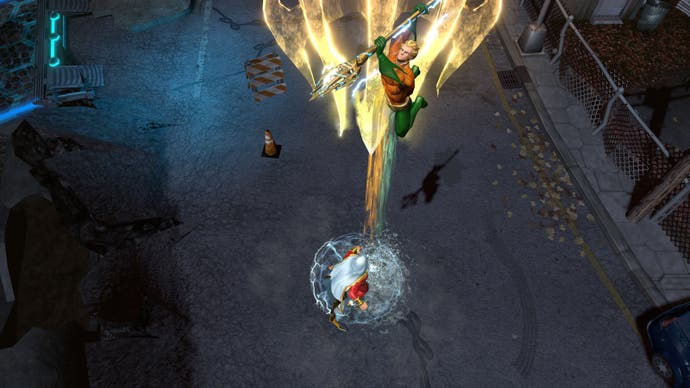
That said, Gotham Divided (the third of the game's maps) will be the most familiar so far to MOBA players. It's divided into three lanes, each of them a path between the two enemy bases, each of them guarded by powerful towers that defend against the drones that surge forward and which must be taken down before a base can be wrecked. The spaces between the lanes are full of neutral creatures that can be killed for experience and additional cash, cash that goes toward better equipment for the hero you're controlling. Some of them also grant very particular bonuses and this is where Infinite Crisis tries something different.
Killing one of these neutrals, a giant grey robot, spawns a beacon back at our base that can be brought into the action and used to temporarily disable an enemy turret. It's ideal for a quick, concentrated push. Another neutral drops a surveillance device that we can use for better map awareness. If we were playing the game's circular map, Gotham Heights, a capture-and-hold affair, then we might try venturing into the middle. A large orbital cannon lies in wait there and capturing it allows a team to launch a meteor into enemy territory, as well as spawn additional drones. At the centre of the game's two lane Coast City map sits a powerful doomsday device that can deliver considerable area-of-effect damage.
The idea behind these extra, tangential objectives isn't just to give players new things to fight with, says Turbine's digital communications manager Leo Tan, but also to give them new things to fight for. "The recurring theme on all of our maps is a focus on objectives, and a focus on objectives to encourage teams to come together in a single teamfight," he explains. "We want the game not just to feel good, but we want it to look good, we want there to be a lot of exciting moments and I think a teamfight is the most exciting moment you can have in a MOBA."
Turbine want to engineer action. They want to bring players together, insofar as they want to find as many reasons as they can for Mecha Wonderwoman to meet and then to punch Gaslight Joker, or whoever else may be around. With an ever-growing roster of superheroes at their disposal, it makes sense that they want to give players plenty of chances to get them all brawling. To this end, parts of Infinite Crisis' maps also feature terrain that can be destroyed so more and more new pathways open up, presenting even more opportunities for heroes to meet, ambush or chase one another as they try to settle scores.
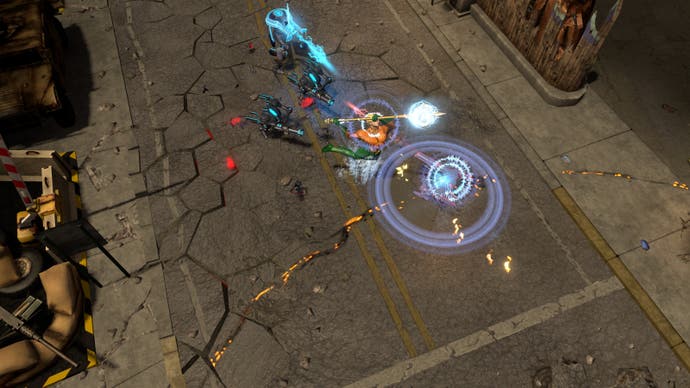
MOBA veterans will notice more subtle, mechanical differences too, says Tan. "On the technical level, if you're a serious MOBA player, you'll see how we make some small but very important changes to the way the game flows. For example, when a drone dies, it drops a coin. Traditionally, your last hit and money gets teleported directly to you. [In Infinite Crisis] if you don't get the last hit, the drone drops the coin and you can pick that up. That credit is shared between everyone in range."
You only collect those credits for you and your fellow superheroes if you do manage to grab that coin and, in the middle of a pitched lane fight, that might not be so easy. Denying the enemy team income could become a valid tactic. Turbine are also keen on the idea of money being shared for hero kills because, Tan adds, it allows everybody to buy more items and enjoy building a more powerful superhero. Whoever you are, "You'll be dealing a lot of damage," he says. "You'll be buying artefacts, you'll feel you're making a more positive contribution than you might in another game."
At the moment, many of the items you can buy are closer to the sort found in League of Legends than in Dota 2. They're mostly about improving your stats, your health, the damage that you do, while your superhero's powers are the source of such effects as stuns, slows or team buffs. Superheroes are also closer to League of Legends' champions in their abilities. As well as sporting four key powers, each also boasts a unique passive power and can pick two other minor powers, chosen from a list before the game begins. Even the way each is unlocked again calls to mind League of Legends, with each superhero having a cost in points (which are gradually earned) or Crisis Coins, the game's premium currency.
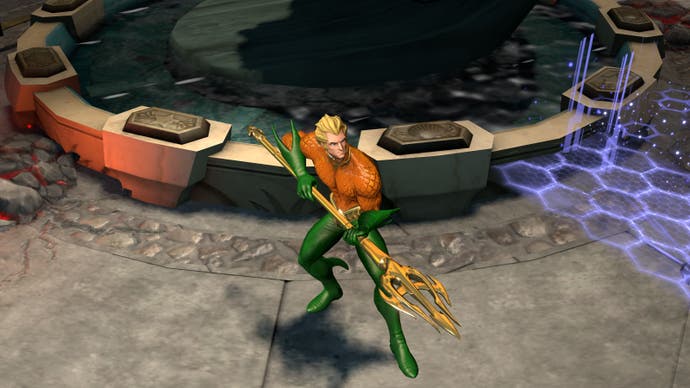
But the fights feel more like those of Dota 2. Death can come swiftly and many of the most powerful attacks need to be precisely aimed, being entirely ineffective if fired slightly off-target or half a second too late. As in all MOBAs, player co-ordination is vital and the winning team is the one that can deploy all its abilities in the right places, at the right time and in the right order.
And most importantly, irrespective of whether it feels more like Dota 2 or like League of Legends, Infinite Crisis feels like a MOBA. It has distinct characters with distinct abilities, as well as that same sense of momentum as one side or another starts to gain an edge and swing the game in their favour. It has room for cunning team combinations, while map awareness and judicious use of wards is vital to success.
Whether its particular spin on the genre will win it an audience or distinguish it enough remains to be seen, not least because the game is still evolving. Tan concedes that there's still much to be done and Turbine's biggest challenge is "expectation," both from MOBA fans and DC fans. Based both on the game's uptake during its beta stage and the e-sports interest it's garnered, he's confident, but then it's very much his job to be so.
"We're already running tournaments, we're already broadcasting regularly on Twitch. The level of community engagement is much stronger than it would traditionally have been with a video game at this stage," he says. "A lot of players have already taken Infinite Crisis very seriously. They've organised themselves into teams and big names like Dignitas have come along."
The power of the DC Comics license will have certainly contributed to Infinite Crisis' profile, lifting it above many of its wannabe peers and giving it a strong head start. It's also given it a quite unique selling point: it's not so much a Batman game as a game with multiple Batmans (Batmen?). But no such license was ever necessary for Dota 2 or League of Legends to hook their millions. While the many universes of Infinite Crisis may have made room for several Supermen, MOBA audiences aren't likely to be as accommodating. Winning their approval might be the toughest fight yet.
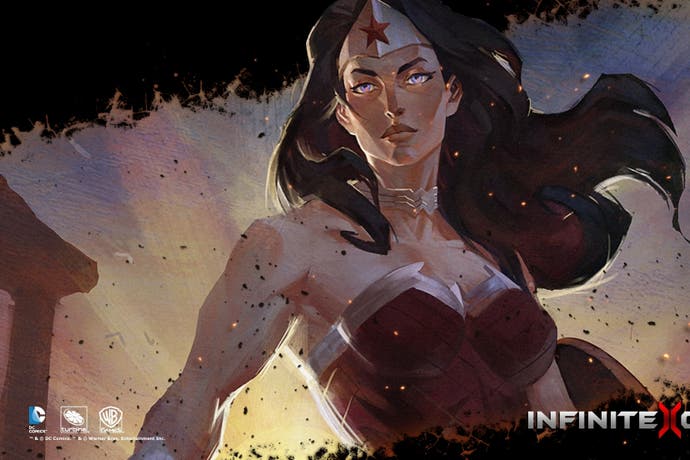

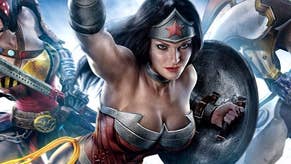
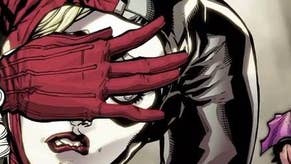

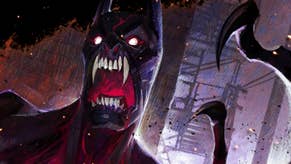



.png?width=291&height=164&fit=crop&quality=80&format=jpg&auto=webp)



